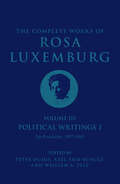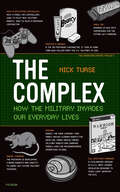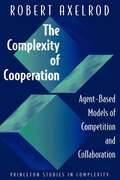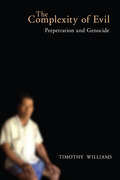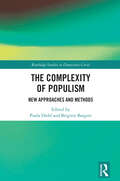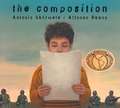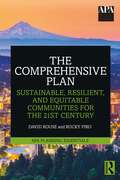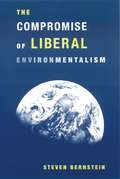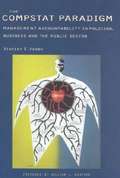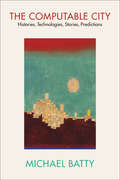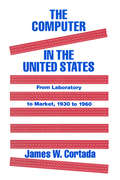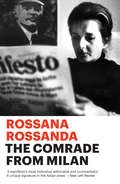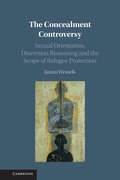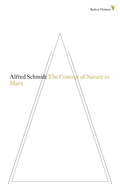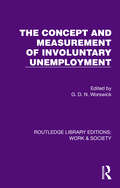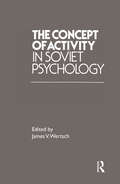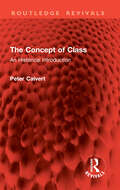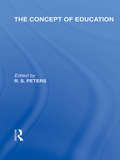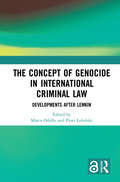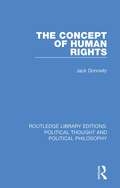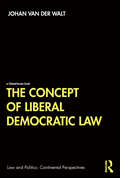- Table View
- List View
The Complete Works of Rosa Luxemburg, Volume III: Political Writings 1: On Revolution-1897-1905
by Rosa Luxemburg Peter HudisRosa Luxemburg's theoretical masterpieceThis collection is the first of three volumes of the Complete Works devoted to the central theme of Rosa Luxemburg’s life and work—revolution. Spanning the years 1897 to the end of 1905, they contain speeches, articles, and essays on the strikes, protests, and political debates that culminated in the 1905 Russian Revolution—one of the most important social upheavals of modern times. Luxemburg’s near-daily articles and reports during 1905 on the ongoing revolution (which comprises the bulk of this volume) shed new light on such issues as the relation of spontaneity and organization, the role of national minorities in social revolution, and the inseparability ofthe struggle for socialism from revolutionary democracy. We become witness to Luxemburg’s effort to respond to the impulses, challenges, and ideas arising from a living revolutionary process, which in turn becomes the source of much of her subsequent political theory—such as her writings on the mass strike, her strident internationalism, and her insistence that revolutionary struggle never take its eyes off of the need to transform the human personality.Virtually all of these writings appear in English for the first time (translated from both German and Polish) and many have only recently been identified as having been written by Luxemburg.
The Complete Writings of Bhagat Singh: Why I am an Atheist, The Red Pamphlet, Introduction to Dreamland, Letter to Jaidev Gupta...and other works
by Bhagat SinghThis ebook is a collection of the complete writings of Bhagat Singh, an Indian socialist revolutionary whose two acts of dramatic violence against the British in India and execution at age 23 made him a folk hero of the Indian independence movement. Works included: The Problem of Punjab's Language and Script Blood Sprinkled on the Day of Holi Babbar Akalis on the Crucifix Beware, Ye Bureaucracy Letter to Shaheed Sukhdev The Red Pamphlet Joint Statement of Bhagat Singh and B. K. Dutt in the Assembly Bomb Case Hunger-strikers' Demands Letter to I.G. (Prisons), Punjab Mianwali Jail Message to Punjab Students' Conference Letter to Sukhdev Regarding Suicide Reasons for Refusing to Attend the Court Telegram on Lenin's Death Anniversary Hunger-Strikers' Demands Reiterated Regarding the LCC Ordinance Letter to Jaidev Gupta Justice Hilton Must Also Go Letter to Father Why I am an atheist? Letter to B. K. Dutt To Young Political Workers Regarding Line of Defence In Hari Kishan's Case Last Petition Introduction to Dreamland
The Complex: How the Military Invades Our Everyday Lives (The American Empire Project)
by Nick TurseA stunning breakdown of the modern military-industrial complex—an omnipresent, hidden-in-plain-sight system of systems that penetrates all our lives.From iPods to Starbucks to Oakley sunglasses, national security expert Nick Turse explores the Pentagon’s little-noticed contacts (and contracts) with the products and companies that now form the fabric of America. He investigates the remarkable range of military incursions into the civilian world: the Pentagon’s collaborations with Hollywood filmmakers; its outlandish schemes to weaponize the wild kingdom; its joint ventures with Marvel Comics and Nascar, and he spotlights the disturbing way in which the military, desperate for fresh recruits, has tapped into the online world by “friending” young people on social networks.A striking vision of a brave new world of remote-controlled rats and super-soldiers who need no sleep, The Complex will change our understanding of the militarization of America. We are a long way from Eisenhower’s military-industrial complex: this is the essential book for understanding its twenty-first-century progeny.“With a combination of wit and number-crunching, Turse gives a multidimensional picture of the biggest elephant in every room: the Pentagon.” —Foreign Policy in Focus“A brilliant exposé of the Pentagon’s pervasive influence in our lives.” —Chalmers Johnson, author of the Blowback Trilogy“A deeply disturbing audit of the Pentagon’s influence on American life. . . . If Nick Turse is right, The Matrix may be just around the corner.” —Mike Davis, author of Buda’s Wagon: A Brief History of the Car Bomb
The Complexity of Cooperation: Agent-Based Models of Competition and Collaboration (Princeton Studies in Complexity #3)
by Robert AxelrodRobert Axelrod is widely known for his groundbreaking work in game theory and complexity theory. He is a leader in applying computer modeling to social science problems. His book The Evolution of Cooperation has been hailed as a seminal contribution and has been translated into eight languages since its initial publication. The Complexity of Cooperation is a sequel to that landmark book. It collects seven essays, originally published in a broad range of journals, and adds an extensive new introduction to the collection, along with new prefaces to each essay and a useful new appendix of additional resources. Written in Axelrod's acclaimed, accessible style, this collection serves as an introductory text on complexity theory and computer modeling in the social sciences and as an overview of the current state of the art in the field. The articles move beyond the basic paradigm of the Prisoner's Dilemma to study a rich set of issues, including how to cope with errors in perception or implementation, how norms emerge, and how new political actors and regions of shared culture can develop. They use the shared methodology of agent-based modeling, a powerful technique that specifies the rules of interaction between individuals and uses computer simulation to discover emergent properties of the social system. The Complexity of Cooperation is essential reading for all social scientists who are interested in issues of cooperation and complexity.
The Complexity of Evil: Perpetration and Genocide (Genocide, Political Violence, Human Rights)
by Timothy WilliamsWhy do people participate in genocide? The Complexity of Evil responds to this fundamental question by drawing on political science, sociology, criminology, anthropology, social psychology, and history to develop a model which can explain perpetration across various different cases. Focusing in particular on the Holocaust, the 1994 genocide against the Tutsi in Rwanda, and the Khmer Rouge genocide in Cambodia, The Complexity of Evil model draws on, systematically sorts, and causally orders a wealth of scholarly literature and supplements it with original field research data from interviews with former members of the Khmer Rouge. The model is systematic and abstract, as well as empirically grounded, providing a tool for understanding the micro-foundations of various cases of genocide. Ultimately this model highlights that the motivations for perpetrating genocide are both complex in their diversity and banal in their ordinariness and mundanity.
The Complexity of Populism: New Approaches and Methods (Routledge Studies in Democratic Crisis)
by Paula Diehl Brigitte BargetzThis book explores the mechanisms and elements of populism to develop new theoretical and methodological approaches. Much as populism has been researched, it remains a contested notion without coherent definition and methodology and shaped by dimensions such as ideology, communication style, discourse, mobilization, and organization. It has simultaneously mobilized emotions, produced symbols, affected subjectivity and gender relations, and can manifest itself in different ways and appear in hybrid forms, such as in the cases of Silvio Berlusconi, Hugo Chávez, and Donald Trump. International expert contributors explore how such a variety of phenomena can be explained and analysed, expanding the scope of populism research by proposing a multidimensional and complex understanding of populism. They argue for greater epistemological differentiation and propose a methodology that integrates different fields of politics. This complex approach makes it possible to analyse populism as a multifaceted phenomenon and to understand how populisms affect politics and society. Aimed at postgraduates and researchers in populism as well as scholars in political science and sociology, media, communication, cultural, gender, and global studies, the volume also contributes to a better understanding of manifestations of right-wing and authoritarian populism in the twenty-first century.
The Complexity of Self Government
by Ruth LaneThe Complexity of Self Government represents a revolutionary approach to political science. Bottom-up theory turns political and social analysis upside down by focusing analytic attention not on vacuous abstractions but on the individual men and women who either consciously or inadvertently create the institutions within which they live. Understanding this practical level of human activity is made possible through complexity theory, recently developed in computer models, but of wider use in understanding everyday human behaviour. To this complexity framework, the book adds social science to give life and colour to the analytical picture: micro-sociology from Garfinkel and Goffman, anthropology from Bourdieu, and non-technical game theory based on Thomas Schelling's microanalytics, to give rigour and bite. Theoretical examples include India's Mumbai, Iran, the marshes of southern Iraq, Berlusconi's Italy, backcountry China, Zimbabwe, and Nelson Mandela's revolution in South Africa.
The Composition
by Antonio SkármetaIn a village in Chile, Pedro and Daniel are two typical nine-year-old boys. Up until Daniel's father gets arrested, their biggest worry had been how to improve their soccer skills. Now, they are thrust into a situation where they must grapple with the incomprehensible: dictatorship and its inherent abuses. "The Composition" is a winner of the Americas Award for Children's Literature and the Jane Addams Children's Book Award.
The Composition of Fiscal Adjustment and Growth
by G. A. Mackenzie David W. H. Orsmond Philip R. Gerson#Includes bibliographical references.
The Comprehensive Plan: Sustainable, Resilient, and Equitable Communities for the 21st Century (APA Planning Essentials)
by Rocky Piro David RouseThe practice of comprehensive planning is changing dramatically in the 21st century to address the pressing need for more sustainable, resilient, and equitable communities. Drawing on the latest research and best practice examples, The Comprehensive Plan: Sustainable, Resilient, and Equitable Communities for the 21st Century provides an in-depth resource for planning practitioners, elected officials, citizens, and others seeking to develop effective, impactful, comprehensive plans, grounded in authentic community engagement, as a pathway to sustainability. Based on standards developed by the American Planning Association to provide a national benchmark for sustainable comprehensive planning, this book provides detailed guidance on the substance, process, and implementation of comprehensive plans that address the critical challenges facing communities in the 21st century.
The Compromise of Liberal Environmentalism
by Steven BernsteinThe most significant shift in environmental governance over the last thirty years has been the convergence of environmental and liberal economic norms toward "liberal environmentalism"--which predicates environmental protection on the promotion and maintenance of a liberal economic order. Bernstein assesses the reasons for this historical shift, introduces a socio-evolutionary explanation for the selection of international norms, and considers the implications for our ability to address global environmental problems.
The Compromise of Liberal Environmentalism
by Steven BernsteinThe most significant shift in environmental governance over the last thirty years has been the convergence of environmental and liberal economic norms toward "liberal environmentalism"—which predicates environmental protection on the promotion and maintenance of a liberal economic order. Steven Bernstein assesses the reasons for this historical shift, introduces a socio-evolutionary explanation for the selection of international norms, and considers the implications for our ability to address global environmental problems.The author maintains that the institutionalization of "sustainable development" at the 1992 United Nations Conference on Environment and Development (UNCED) legitimized the evolution toward liberal environmentalism. Arguing that most of the literature on international environmental politics is too rationalist and problem-specific, Bernstein challenges the mainstream thinking on international cooperation by showing that it is always for some purpose or goal. His analysis of the norms that guide global environmental policy also challenges the often-presumed primacy of science in environmental governance.
The Compstat Paradigm
by Vincent HenryTo reduce crime, disorder and fear so as to allow for a restoration of confidence and quality of life in America's largest city.
The Computable City: Histories, Technologies, Stories, Predictions
by Michael BattyHow computers simulate cities and how they are also being embedded in cities, changing our behavior and the way in which cities evolve.At every stage in the history of computers and communications, it is safe to say we have been unable to predict what happens next. When computers first appeared nearly seventy-five years ago, primitive computer models were used to help understand and plan cities, but as computers became faster, smaller, more powerful, and ever more ubiquitous, cities themselves began to embrace them. As a result, the smart city emerged. In The Computable City, Michael Batty investigates the circularity of this peculiar evolution: how computers and communications changed the very nature of our city models, which, in turn, are used to simulate systems composed of those same computers.Batty first charts the origins of computers and examines how our computational urban models have developed and how they have been enriched by computer graphics. He then explores the sequence of digital revolutions and how they are converging, focusing on continual changes in new technologies, as well as the twenty-first-century surge in social media, platform economies, and the planning of the smart city. He concludes by revisiting the digital transformation as it continues to confound us, with the understanding that the city, now a high-frequency twenty-four-hour version of itself, changes our understanding of what is possible.
The Computer in the United States: From Laboratory to Market, 1930-60
by James W. CortadaThis book studies how a technological innovation -- in this case the computer -- progresses from its origin as an idea in someone's mind to its eventual manifestation as a useable and marketable consumer product.
The Comrade from Milan
by Rossana RossandaIn this much-lauded memoir, acclaimed for its blend of literary elegance and political passion, Rossana Rossanda, a legendary figure on the Italian left, reflects on a life of radical commitment.Active as a communist militant in the Italian Resistance against fascism during World War Two, Rossanda rose rapidly in its aftermath, becoming editor of the Communist Party weekly paper and a member of parliament. Initially a party loyalist, she was critical of the party&’s conservatism in the face of new radical movements and moved into opposition during the late 1960s. The breach widened after she and others publicly opposed the Soviet invasion of Czechoslovakia, and were expelled in 1969. She went on to help found the influential paper il manifesto, which remains the most critical daily in Berlusconi&’s Italy. Her unique experience enables her to reconstruct that period with flair and authority. She paints a revealing picture of fascism, communism, post-war reconstruction and the revolts that shook Europe in the 1960s. In The Comrade from Milan, one of the most influential intellectuals of the European Left relives the storms of the twentieth century. Both cool-headed and precise, Rossanda provides a rare insight into what it once meant to be politically engaged.
The Concealment Controversy: Sexual Orientation, Discretion Reasoning and the Scope of Refugee Protection
by Janna WesselsThe idea that a claim for international protection can be rejected on the basis that the claimant behave 'discreetly' in their country of origin has remained resilient in asylum claims based on sexual orientation, but also other grounds of claim. This is significant because requiring an asylum-seeker to forgo the reason for which they are persecuted questions the very rationale of refugee protection. This book represents the first principled examination of concealment in refugee law. Janna Wessels connects the different strands of the long-standing debate in both common and civil law jurisdictions and scholarship concerning the question of whether and under which circumstances a claimant must conceal to avoid persecution. In so doing, Wessels uncovers a fundamental tension at the core of the refugee concept. By using sexuality as a lens, this study breaks new ground regarding sexual orientation claims and wider issues surrounding the refugee definition.
The Concept Of Nature In Marx
by Alfred SchmidtIn The Concept of Nature in Marx, Alfred Schmidt examines humanity's relation to the natural world as understood by the great philosopher-economist Karl Marx, who wrote that human beings are 'part of Nature yet able to stand over against it; and this partial separation from Nature is itself part of their nature'. In Marx, industry and science are the mediation between historical man and external nature, leading either to reconciliation or mutual annihilation. Schmidt explores this tension between man and nature in Marx and shows how his understanding of nature is reflected in the work of writers such as Bertolt Brecht, Walter Benjamin and Ernst Bloch.
The Concept and Measurement of Involuntary Unemployment (Routledge Library Editions: Work & Society)
by Worswick, G. D. N.Originally published in 1976, the 14 papers in this collection discuss the history and significance of the concept of 'involuntary unemployment’, particularly as seen from a Keynesian perspective. The micro-economic foundations of employment and job-search theory and the measurement and the significance of employment statistics are also examined. Later sections consider aspects of unemployment as economic indicators and the relationship between unemployment and vacancies, as well as the social aspects of unemployment. A final chapter considers employment policies during the 20th century in the light of managing the economy.
The Concept of Activity in Soviet Psychology
by James V. WertschAn anthology of Chinese writings drawn from the late-1980s Maoist revival in mainland China. Illustrated with photographs and drawings, these selections are introduced and annnotated to provide an appreciation of their historical significance and the ideological confusion in China.
The Concept of Class: An Historical Introduction (Routledge Revivals)
by Peter CalvertOriginally published in 1982, The Concept of Class provides a concise and stimulating guide to the historical development of the concept of ‘class’ and the different ways in which it has been applied in social and political theory. The author begins by determining where and how the word acquired its political sense, and after a short re-examination of its classical background, moves on to consider Marx’s reformulation of the concept and his proposals for making it a fundamental term in the study of society. He traces the different strands of Marxist and non-Marxist use of the term right up to the twentieth century, considers the confusion of ideas that had resulted at the time, and analyses the utility of ‘class’ in assessing the nature of contemporary socialist states and post-industrial capitalist societies.In conclusion, Dr Calvert suggests that class is an ‘essentially contested concept’ – that is, a concept on which agreement is by its nature impossible. Today it can be read in its historical context.
The Concept of Education (International Library of the Philosophy of Education Volume 17)
by R. S. PetersA series of public lectures given at the Institute of Education, University of London provides the nucleus around which this collection, originally published in 1967, is gathered. This collection provides comprehensive coverage of a complex theme which will be of interest to those involved in the fields of philosophy and education alike. Topics covered include:the logical and psychological aspects of learning, the concept of play, rule and routines, teaching and training, philosophical models of teaching.
The Concept of Genocide in International Criminal Law: Developments after Lemkin
by Marco OdelloThis book presents a review of historical and emerging legal issues that concern the interpretation of the international crime of genocide. The Polish legal expert Raphael Lemkin formulated the concept of genocide during the Nazi occupation of Europe, and it was then incorporated into the 1948 Convention on the Prevention and Punishment of the Crime of Genocide. This volume looks at the issues that are raised both by the existing international law definition of genocide and by the possible developments that continue to emerge under international criminal law. The authors consider how the concept of genocide might be used in different contexts, and see whether the definition in the 1948 convention may need some revision, also in the light of the original ideas that were expressed by Lemkin. The book focuses on specific themes that allow the reader to understand some of the problems related to the legal definition of genocide, in the context of historical and recent developments. As a valuable contribution to the debate on the significance, meaning and application of the crime of genocide the book will be essential reading for students and academics working in the areas of Legal History, International Criminal Law, Human Rights, and Genocide Studies.
The Concept of Human Rights (Routledge Library Editions: Political Thought and Political Philosophy #19)
by Jack DonnellyFirst published in 1985. In this study, Donnelly distinguishes between "having a right" and "being right" and elaborates the distinction with great subtlety to show that rights have to be understood as action and not as a possession. This is done with such clarity and good sense that he is able to cast light on all aspects of the often confusing discussions of the natures and usages of "right". He illuminates an astonishing range of issues, from the limitations of Thomist and utilitarian conceptions of right to the confusions of many present-day defenders of rights, both in the West and the Third World. As importantly, Donnelly is centrally concerned with the human aspect of "human rights". He is thus able to rest his discussion of rights on a plausible philosophical anthropology as well as an appreciation of an historical dimension to human rights, and, at the end of his book, is able to open the door towards potential new developments in the discussion of human rights. Down the path he points us lies a reconciliation of the notion of individual rights with that of political community. This title will be of great interest to students of politics and philosophy.
The Concept of Liberal Democratic Law (Law and Politics)
by Johan van Der WaltThis book develops a historical concept of liberal democratic law through readings of the pivotal twentieth century legal theoretical positions articulated in the work of Herbert Hart, Ronald Dworkin, Duncan Kennedy, Rudolf Smend, Hans Kelsen and Carl Schmitt. It assesses the jurisprudential projects and positions of these theorists against the background of a long history of European metaphysics from which the modern concept of liberal democratic law emerged. Two key narratives are central to this history of European political and legal metaphysics. Both concern the historical development of the concept of nomos that emerged in early Greek legal and political thought. The first concerns the history of philosophical reflection on the epistemological and ontological status of legal concepts that runs from Plato to Hobbes (the realist-nominalist debate as it became known later). The second concerns the history of philosophical and political discourses on law, sovereignty and justice that starts with the nomos-physis debate in fifth century Athens and runs through medieval, modern and twentieth century conceptualisations of the relationship between law and power. Methodologically, the reading of the legal theoretical positions of Hart, Dworkin, Kennedy, Smend, Kelsen and Schmitt articulated in this book is presented as a distillation process that extracts the pure elements of liberal democratic law from the metaphysical narratives that not only cradled it, but also smothered and distorted its essential aspirations. Drawing together key insights from across the fields of jurisprudence and philosophy, this book offers an important and original re-articulation of the concept of democratic law.
